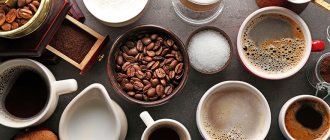Alcohol is added to coffee quite often: there are various cocktails that have already become classics. But vodka is used relatively rarely, and more often in shots than in hot drinks. However, such cocktails also exist, and they have their fans. Perhaps you should learn more about how to make coffee with vodka to make it really tasty and interesting.
What is the name of the drink made from coffee with vodka?
The cocktail made from coffee and vodka is called Karsk, but this is a Norwegian name. Karsk, after all, consists of coffee and moonshine, 96 degrees or so. Therefore, very little is added. But coffee with traditional vodka does not have an official, well-known name. In American bars it is sometimes called Black Russian, but the standard Black Russian is made with vodka and coffee liqueur, so this name is still not canonical. And they rarely know about Karsk in domestic bars. There is also a “Russian Coffee” version, but regular or whipped cream is also added.
There is no single clear and understandable name for everyone. But in any bar you can prepare this cocktail, since the ingredients are always available, and no special cooking skills are required. You can make it at home, it's very simple.
Irish version
Traditional Irish coffee is made with whiskey. In the adapted recipe, you need to scald the cup with boiling water and wipe dry. Pour in 2 tsp. vodka and add 2 pieces of refined sugar. Stir the base until the sugar dissolves. Top up the container with strong double espresso. Place 2 tsp on the surface of the foam. whipped cream and coffee beans.
The spectacular drink can be prepared in layers, trying to maintain the line between sweet alcohol and thick coffee.
The effect of coffee with vodka
The combination of vodka and coffee tones, invigorates, and energizes. In Norway, the cocktail is widely consumed in rural areas, and young people also like to drink it before a party to get in the mood for fun and activity. And after a party or a stormy holiday, it is consumed en masse to relieve hangover symptoms.
- Serve the drink hot and it will help warm you up quickly, especially if you are cold and feel like you might get sick.
- Make an iced cocktail, and in the heat you will quickly feel a surge of energy, freshness, and activity.
One serving won't hurt, but don't overdo it. And remember that you can’t drive after drinking such a drink!
The main rules for painting moonshine
And in order not to “mess up” with various ingredients and not spoil the product on which you have spent time and money, adhere to the well-known rules.
- Use only food grade raw materials for your own safety. When using wood chips or bark, find out whether the wood has been chemically treated.
- First, experiment with a small amount of moonshine. Sometimes, when interacting with alcohol, the coloring matter can create a “wild” color. Therefore, it is better to find out exactly the dosage of raw materials using a small quantity. For example, per liter.
- Mix the ingredients in a glass or enamel (stainless) bowl.
- Stick to the recipe.
- After infusion, strain the moonshine so that the remaining particles of the coloring matter do not oversaturate it over time.
- Store colored moonshine in glass under a tight lid in a place inaccessible to light, otherwise it may fade over time.
Consequences of drinking coffee with vodka
If not abused, the drink can even be beneficial. Small doses of alcohol relax and train the cardiovascular system, help you relax, forget about stress and feel better. But, in fact, alcohol and caffeine are two strong stimulants that can sharply raise blood pressure. And at high temperatures, alcohol is absorbed faster and more actively, which can negatively affect your well-being.
If after drinking the drink you feel unwell, try to drink milk and rest for about 20 minutes, the tachycardia and anxiety will pass.
How do antibiotics affect the body?
It is not without reason that drugs in this group are taken only as prescribed by a doctor. The principle of their action is to destroy or suppress the growth of bacteria, all of them (both beneficial and harmful).
They attack:
• Cellular synthesis apparatus. This prevents bacteria from building protective peptide walls.
• DNA gyrase. This prevents the replication of genetic information and inhibits the proliferation of pathogenic microorganisms.
• Protein biosynthesis apparatus (ribosomes) - without it, bacteria die.
Modern pharmacology is trying to make antibiotics more selective. But their use leads to an imbalance of microflora. Beneficial bacteria, which form a kind of shield in the intestines, also suffer. Therefore, only a specialist can compare the effect of treatment with possible losses. Also, a number of antibacterial drugs have the property of hepatotoxicity. They damage liver cells, causing cholestasis (impaired bile flow) or necrosis (tissue death).
Vodka coffee recipes
Try making coffee with vodka at home: it’s not difficult at all, and with a minimum of ingredients you can make several cocktails at once. Here are some basic rules to help you navigate the principles of cooking and mixing:
- Always add a spoonful of sugar per serving unless other sweetening ingredients are available. Otherwise, you will have a very bitter and sour drink, and it will be difficult to drink. Sugar is stirred into hot coffee.
- Espresso from a coffee machine is better, as it creates foam. You can brew coffee in a Turkish coffee pot, but then let it sit so that the grounds settle and a minimal amount gets into the cup.
- The quality of vodka in a cocktail is not too noticeable, especially in an iced one, but you should still understand that you should take something from the middle price segment; the cheapest one may have an unpleasant aftertaste.
- You can use flavored vodka, it will be even more interesting. Pepper flavors are unlikely to be appropriate, but fruit flavors will work well.
- As an additive, you can use lemon or milk/cream, and even whipped cream, but not together so that the milk does not curdle.
- You can add piquancy and interest to the taste by using various “coffee spices” - vanilla, cinnamon, nutmeg, cardamom, cloves.
Basic recipe
- Double espresso – 60 ml;
- Vodka – 30 ml;
- Sugar – 1 teaspoon.
Almost like Karsk: stir sugar into espresso and pour vodka into a cup. Alternatively, you can pour vodka into a martini glass, carefully pour espresso on top, and place a coffee bean on top of the foam.
Coffee with vodka and milk
- 60 ml espresso;
- 30 ml vodka;
- 30 ml milk;
- A spoonful of sugar.
Making Russian Coffee: just add warmed milk to the basic recipe, you can even use cream. They will soften the alcoholic aroma and taste and make the cocktail softer. Dairy products will also add sweetness to the coffee, so it will be interesting. This way you can “reanimate” a drink that turned out to be too strong.
Homemade Baileys: coffee with vodka and condensed milk
- Coffee – 100 ml;
- Vodka – 40 ml;
- Cream – 40 ml;
- Condensed milk – 40 ml.
Combine condensed milk and cream, whisk lightly until the mixture is smooth. You can reheat if the ingredients are cold, but do not boil. Brew coffee, add vodka and cream mixture. You can mix alcohol with cream and condensed milk, cool it, and make iced coffee with ice.
Energy boost: coffee with vodka and cola
- Espresso or instant coffee stick;
- 30 ml vodka;
- 150 ml cola.
This is a cold drink, you can add ice, or just use cold cola and cold espresso. Or instant coffee. Just carefully mix all the ingredients in one glass. There is no need to add sugar, cola is already sweet. The mixture really strongly and quickly invigorates, tones, and stimulates. Perhaps not the best choice if intellectual work is required, but for physical energy it’s what you need!
Ice coffee with vodka
- Double shot of espresso;
- Sugar – 2 teaspoons, or syrup, 30 ml.
- Vodka – 50 ml.
- Ice.
Pour ice into a glass, stir sugar or syrup into hot espresso, and combine all ingredients together. Alternatively, you can add lemon or orange, cream or milk. If you add spices to your coffee when preparing it, the taste will be even more interesting.
With liqueur
- Coffee – 50 ml;
- Vodka – 50 ml;
- Liqueur – 50 ml.
A strong, interesting, multi-faceted cocktail in terms of taste, and, conveniently, you can easily vary the taste yourself, as you choose the liqueur. You can add any creamy or fruit liqueurs, chocolate, coffee, caramel - whatever you have and like. Experiment.
You can prepare almost any coffee-alcoholic cocktails on a vodka basis, for example, those that use whiskey, rum, cognac, replacing strong alcohol with vodka.
IBD and alcohol
One of the most popular questions from patients (after “What to eat?”) is “What can I drink?” Similar questions are asked by patients with a mild course of the disease without significant symptoms or after achieving remission.
What do we know about alcohol in IBD? Has any research been done on this topic? Oddly enough, they were carried out (and quite large and convincing).
In 2022, the results of the EPIC study were published, which included 262,451 participants (Bergmann MM. et al., 2017). Alcohol consumption by study participants was assessed by quantity (not drinking, former, low, moderate, high alcohol consumption), taking into account norms for men and women. Since follow-up (i.e., since 1993), ulcerative colitis was newly diagnosed in 198 participants, and Crohn's disease in 84 people. The statistical analysis showed that alcohol consumption does not in any way affect the likelihood of developing ulcerative colitis and Crohn's disease.
These results were later confirmed (though only for ulcerative colitis) by a meta-analysis of clinical studies, which statistically assessed the results of 9 studies examining alcohol as a risk factor for IBD. The result is the same - alcohol consumption is not a risk factor for ulcerative colitis.
But chronic alcohol abuse (alcoholism) increases the risk of IBD , as convincingly demonstrated by a study by Chinese authors. They analyzed data from a 10-year follow-up of nearly 58,000 cases of hospitalized individuals diagnosed with alcohol intoxication, comparing them with a control group that did not abuse alcohol. The risk of identifying new cases of IBD was 3.17 times higher among people suffering from alcoholism, of which 4.4 times for Crohn's disease and 2.33 times for ulcerative colitis.
“Thank you, doctor,” the patient will say, “but I would like to be absolutely sure that alcohol will not provoke an exacerbation of my disease.”
Such fears are not unfounded. It is known that ethanol, which is part of alcoholic beverages, reduces the activity of intestinal immune cells and suppresses the production of certain cytokines, and also (which is most important for IBD!) increases the permeability of the intestinal wall. Thus, in theory, it is possible to harm the intestines by drinking alcohol, but the extent of the negative impact of ethanol is still unknown.
Research does not provide a clear answer to the question of how alcohol affects the course of the disease. On the one hand, their number is limited, and the number of subjects rarely exceeds several dozen people. On the other hand, most of these studies are based on surveys, including retrospective ones.
However, some interesting data is available for analysis. In 2004, Jowett et al published a study of 191 patients with ulcerative colitis in clinical remission. During the year, patients were periodically surveyed about the amount and nature of foods and drinks consumed, including alcohol. After 12 months, exacerbation of the disease was observed in 52% of patients.
It was found that drinking alcohol in moderate doses did not increase the risk of exacerbation, while taking high doses of alcohol increased the risk of exacerbation of ulcerative colitis by 2.71 times. A limitation of the study was the lack of precise information about dangerous and safe doses of alcohol.
Another interesting work was carried out in the USA. 14 patients with ulcerative colitis and Crohn's disease in remission, as well as 7 healthy volunteers, took part in a study that assessed the effect of wine consumption on the course of the disease. For a week, each patient drank 1-3 glasses of dry red wine per day (approximately 0.4 g of ethanol per 1 kg of body weight). Before and after the study, blood tests, stool tests for fecal calprotectin, and intestinal permeability were assessed. There were no cases of exacerbation of the disease during the study. Patients showed a significant increase in small intestinal (in Crohn's disease) and large intestinal (in ulcerative colitis) permeability. Since intestinal permeability plays an important role in the development of IBD and can generally be considered an early marker of inflammation, it is likely that regular consumption of wine, even in small quantities, will lead to an exacerbation of the disease. At the same time, the majority of participants before the start of the study had an increased level of fecal calprotectin, that is, it is possible that the remission of the disease was only clinical.
Interestingly, a week after daily consumption of wine, the level of calprotectin in patients with IBD significantly decreased.
Finally, one of the latest studies, also performed in the United States at the end of December 2022, assessed digestive symptoms in individuals who drink alcohol. Of 90 patients with inactive IBD, 62% regularly drank alcohol in varying amounts, which is broadly comparable to the nation as a whole (61% of Americans drink occasionally). Of the total number of alcohol drinkers, 75% of patients with IBD noted that they subsequently experienced a worsening of symptoms (abdominal pain, loose stools, bloating, etc.). This study was again based on a patient survey, which limits its value.
The question remains unanswered: “Which alcohol is less harmful to the intestines?” Large studies assessed the use of alcohol in general, while smaller studies assessed the use of red wine.
It is likely that the most important factor will be the total amount of ethanol in the daily “glass” rather than its type.
After analyzing the results of clinical studies, it becomes clear that drinking alcohol with IBD is possible, but “in moderation” (infrequently and in moderate quantities). Constant consumption of alcohol, especially in high doses, can provoke an exacerbation of the disease.
It is not recommended to drink alcohol at the same time as certain medications taken by patients with IBD. Severe drug-induced liver damage may occur with concomitant use of metronidazole and ethanol. Taking other medications (mealazines, azathioprine/mercaptopurine, steroid hormones) does not exclude the possibility of occasional drinking of alcohol in small doses.
Is it possible to mix coffee with vodka?
Yes, you can do this. There is generally room for imagination - you can stir or pour in layers, pour vodka down and coffee on top, or vice versa, so that the layer of alcohol remains at the top, warms up, and can be set on fire.
The only thing is don’t pour alcohol into the Turk, as when heated, alcohol vapors quickly evaporate. Do not try to brew coffee with vodka or mix instant powder directly into alcohol.
Remember that this is an alcoholic drink, even if there is not much alcohol in it. It will invigorate you, but the smell of alcohol will remain, and even if you do not feel intoxicated, it is better not to drive in this state. Be careful when discovering new flavors of coffee-alcoholic cocktails, and then you will only experience positive effects, a surge of strength and energy, tone and activity!
Features of coffee liqueurs
Coffee tincture will relieve fatigue, invigorate, warm, and improve your mood. It can be made using coffee beans, natural ground coffee, even instant coffee. The taste of the tincture depends on the quality of coffee and alcohol. You cannot correct one taste with another, and you should never do this. Take care of your health. You need to choose high-quality components right away, then you will be pleased with the result. The peculiarity of any coffee liqueur is that the coffee in it goes well with spices, citrus fruits, and honey. These additives make the tincture brighter, more palatable, more aromatic, and softer.
Classics of the genre
There are many fairly simple recipes using coffee. Yes, you yourself, using your imagination, can create a wonderful tincture to color the moonshine, give it a more pleasant aroma and additional properties. Here are two of them that are considered classic.
On grains
You need to take 30 - 40 coffee beans and fill them with 1 - 1.5 liters of strong moonshine, leave to infuse in a dark place at room temperature for a month or a month and a half, then strain through a strainer to remove the grains and bottle.
It is necessary to infuse in a dark place so that the sun's rays falling on the jar do not discolor your drink.











